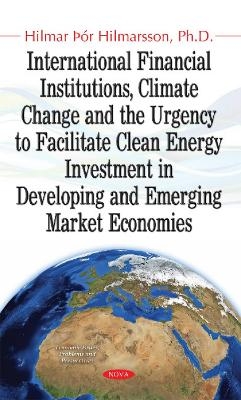Climate change is perhaps among the most serious challenges that humankind has ever faced and perhaps the greatest market failure the world has ever seen. At the same time, clean unutilised energy resources around the world are available that could help remedy climate and environmental problems while also improving peoples lives. It is likely that most of the increased demand for energy in the future will be in the developing and emerging world. This is also where most unutilised clean energy sources are located. The challenge of climate change requires strong comprehensive and firm action from the international community. Clean energy projects tend to be large, capital intensive and long term. They require long term commitment from all the players involved as well as mutual trust. International financial institutions (IFIs), including the World Bank Group and regional development banks can play a key role in promoting the use of clean energy sources by facilitating clean energy investment in developing and emerging markets. This book focuses on those challenges, mainly using geothermal energy projects as examples, but also by providing an example of a large hydropower project to illustrate how the funding and risk mitigation instruments of IFIs, as well as national agencies such as export credit agencies (ECA)s, have been used to mobilise funds in a difficult investment environment. The book is divided into eleven chapters. Chapter One discusses the current global investment regime and the absence of an international organisation for investments comparable to the World Trade Organization that focuses on cross border trade. Chapter Two examines the World Bank Group and its emphasis on loans instead of guarantees for capital mobilisation. Chapter Three discusses international financial institutions, including regional development banks and their risk mitigation instruments. Chapter Four focuses on how IFIs can make more use of their instruments to support cross border clean energy projects in developing and emerging economies. Chapter Five assesses the effectiveness of the risk mitigation instruments used by the World Bank Group. Chapter Six analyses the upfront development costs associated with geothermal development and geothermal projects. Chapter Seven analyses the costs and benefits of deploying public-private partnerships for clean energy projects. Chapter Eight focuses on contested multilateralism and the recent establishment of new international financial institutions under Chinese leadership, i.e. the Asian Infrastructure Investment Bank and the New Development (BRICS) Bank. Chapter Nine examines Iceland with its geothermal cluster as well as how developing and emerging countries could learn from Icelands experience. Chapter Ten analyses selected cross border clean energy projects, including geothermal and hydropower, and shows how various funding and risk mitigation instruments have been used in practice. Chapter Eleven stresses the urgency for global action to address the climate crisis facing humankind. Finally, the concluding chapter shows how international financial institutions can be key instruments for successful global climate solutions. The book draws on the authors experience in three continents (Africa, Asia and Europe) as a staff member of the World Bank Group.
Hilmar thor Hilmarsson is a Professor at the University of Akureyri, School of Business and Science, Iceland. Dr. Hilmarsson teaches courses on international business and macroeconomics. He received his cand. oecon. degree in Economics from the University of Iceland in 1987, an MA in Economics from New York University in 1989, and a Ph.D. in public administration and economic development from the American University in Washington, D.C. in 1992. He served as a Specialist and Coordinator with the World Bank Group in Washington D.C. from 1990 to 1995, at the World Bank office in Riga from 1999 to 2003 and the World Bank office in Hanoi from 2003 to 2006. From 1995 to 1999 he served as a Special Advisor to the Minister for Foreign Affairs in Iceland. Dr. Hilmarsson has published over 50 scholarly articles and book chapters and has lectured and made presentations in more than 30 universities mainly in Europe and the USA. He has travelled to about 60 countries. He was a Visiting Professor at Stockholm School of Economics in Riga during the fall semester 2013, a Visiting Scholar at the University of Washington in Seattle in the spring semester 2014 and a Visiting Professor at Cornell University during the fall semester 2015. Dr. Hilmarsson is a Visiting Scholar at the University of California, Berkeley during the fall semester 2016.
For Complete Table of Contents, please visit our website at: https://www.novapublishers.com/catalog/product_info.php?products_id=59890



